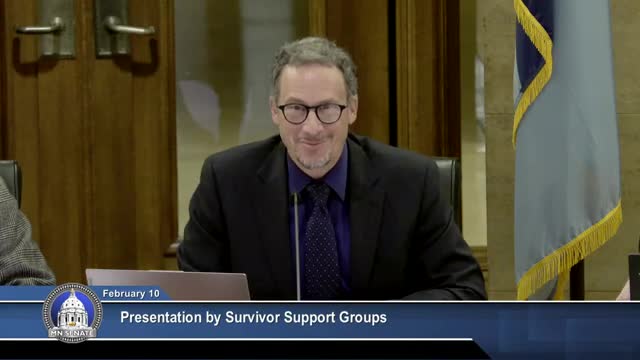Survivor‑service coalitions warn of a 'fiscal cliff' as federal VOCA revenue falls and one‑time state funds expire
Get AI-powered insights, summaries, and transcripts
Subscribe
Summary
Six statewide coalitions testified Feb. 10, 2025 that victim‑service programs face steep cuts as federal Victims of Crime Act funding declines, federal solicitations were temporarily pulled, and recent state one‑time grants expire; coalition leaders urged sustained state investment and higher wages for advocates.
Directors of Minnesota’s six statewide victim‑service coalitions told the Senate Judiciary and Public Safety Committee on Feb. 10 that crime‑victim and survivor programs are facing an acute funding crisis and urged the legislature to provide sustained support.
“Last year, Minnesota had a 40% cut and this year it is expected to be at 42% cut or around another 10,000,000,” Bobbie Holtberg, executive director of the Minnesota Alliance on Crime, said while describing shrinking federal Victims of Crime Act (VOCA) revenue and the impending loss of state one‑time funds. Holtberg warned the committee that “the great progress Minnesota has made in restoring the health and dignity of survivors of crime and violence will be dealt an unrecoverable blow if no new funds are approved.”
Why it matters: VOCA and related federal grants are the largest single funding source for many victim‑service providers; several coalition leaders said federal funding constitutes a large share of their budgets and that last‑year cuts plus expiring state one‑time appropriations create a “fiscal cliff.” Several speakers asked the state to sustain or increase its investment in order to prevent program closures, staff layoffs and lost services for victims across the state.
Who spoke: Guadalupe Lopez, executive director of Violence Free Minnesota, described coalition membership and services that include shelter, legal advocacy, child‑focused services and wraparound supports. Marcia Milliken, executive director of the Minnesota Children’s Alliance, said Minnesota’s child advocacy centers serve more than 3,000 children a year and provide forensic interviews and coordinated multidisciplinary responses to child abuse. Kenosha Alexander of the Minnesota Coalition Against Sexual Assault and Nicole Matthews of the Minnesota Indian Women’s Sexual Assault Coalition described the special vulnerability of tribal communities and stressed jurisdictional complexity for Native victims.
Several leaders highlighted staffing and infrastructure concerns: aging technology (including forensic interview recording equipment), shelter capacity that leads to high turnaway rates, and low wages that make it difficult to recruit and retain specialized advocates. Kenosha Alexander and Mancasa (Minnesota Coalition Against Sexual Assault) leaders said federal funds represent approximately 80% of their operating budgets; Alexander said that percentage drove urgent conversations about payroll and layoffs when federal solicitations were temporarily removed.
Coalitions also outlined programmatic needs for prevention and intervention. Marcia Milliken noted that early treatment for youth who display problematic sexualized behavior can substantially reduce recidivism, and other witnesses pointed to community prevention programs that work with people who have caused harm.
Committee reaction: Senators expressed sympathy and concern. Senator Westland, who described herself as a survivor, urged the body to prioritize victim services. Senators asked follow‑up questions about the federal funding disruptions, the role of one‑time state funds that have been used to stabilize programs, and whether programs exist to intervene with people who perpetrate violence.
What happens next: Coalition leaders asked legislators to stabilize funding streams, increase wages for advocates, and preserve services that serve rural and tribal communities. Committee members indicated the topic will be considered as the budget process advances.
